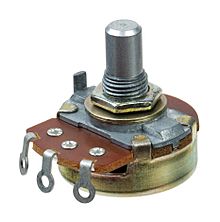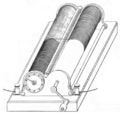Potentiometer facts for kids

A typical single-turn potentiometer
|
|
| Type | Passive |
|---|---|
| Electronic symbol | |
Potentiometers are variable resistors. Potentiometers are resistors where the resistance can be changed using a knob or a slider. Potentiometers are used to control many things, including how bright or dim the lights in your house are and the volume controls on your television.
The idea of a device that could be used to control the amount of electricity going to a component was thought by many people, but the carbon potentiometer we commonly use today was invented by Thomas Edison in 1872 at the age of 25. He called this device a "coiled resistance wire rheostat". His patent for this device was issued in 1872. Carbon resistors, as said above, are the most commonly used resistors today. They are used in radios to control the volume, in televisions to control picture brightness, contrast, and color response. Some are used in voltage dividers.
Different types
There are many different types of potentiometers. These different types include carbon potentiometers, plastic potentiometers, and wire potentiometers. Carbon potentiometers are the most common potentiometers that we use today because they are inexpensive to make and are easy to put together. Wire potentiometers are the most powerful type out of the three listed above. The wire inside the potentiometer is wound so that it has more power. Plastic potentiometers have the same amount of power that carbon potentiometers do, but are of a higher quality. They are made of a special kind of plastic that conducts electricity just as effectively as carbon potentiometers. It as a better life than carbon potentiometers do. Trimmer potentiometers are small.
Images for kids
-
Cutaway drawing of potentiometer showing parts: (A) shaft, (B) stationary carbon composition resistance element, (C) phosphor bronze wiper, (D) shaft attached to wiper, (E, G) terminals connected to ends of resistance element, (F) terminal connected to wiper. A mechanical stop (H) prevents rotation past end points.
-
Slide potentiometers (faders)
-
Charles Wheatstone's 1843 rheostat with a metal and a wooden cylinder
See also
 In Spanish: Potenciómetro para niños
In Spanish: Potenciómetro para niños











